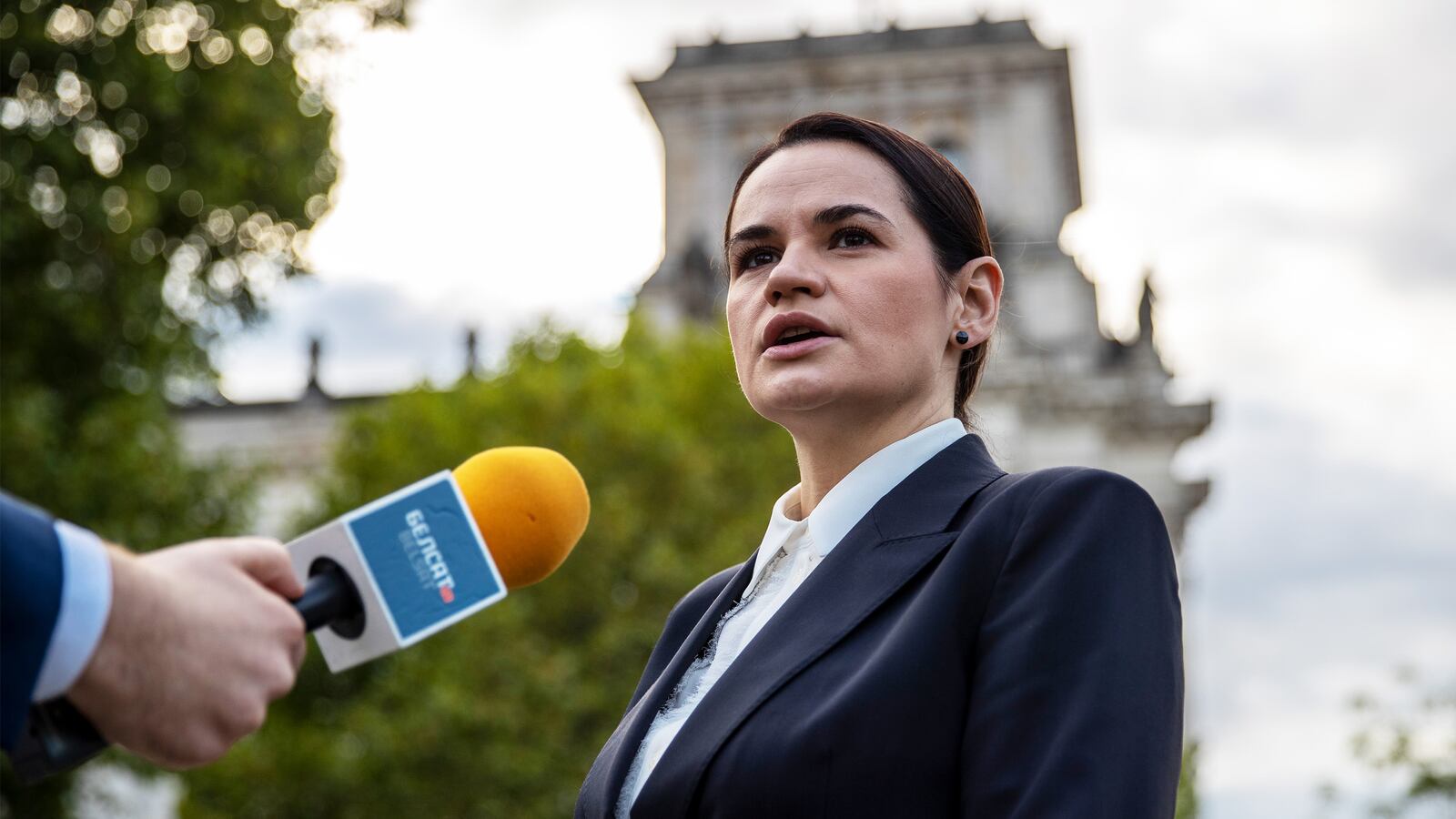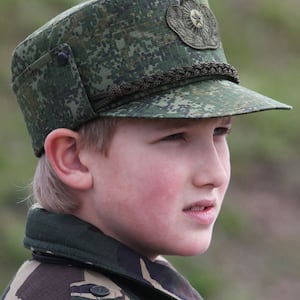MOSCOW—For nearly three months after a contested election, the authoritarian leader of Belarus, Alexander Lukashenko, has clung to power with police violence and beatings. And last week, he issued some of the starkest threats yet of more repression to come, raising worries of a crackdown while the world’s distracted attention is on the U.S. election.
In an exclusive interview with The Daily Beast, the 38-year-old leader of Belarus’ opposition, Svetlana Tikhanovskaya—who is currently in exile in Lithuania, having fled the country after Lukashenko claimed victory—said the American election could also help resolve her country’s tumult. Tikhanovskaya said Belarus is facing the worst social crisis in Europe today, and she hopes that in a new term or with a new president, the United States will wake up to her country’s plight.
“You are the most powerful state, please pay attention, try once again to become a mediator, help to free political prisoners in Belarus,” Tikhanovskaya said of her message to the eventual U.S. election winner. “Please act faster, do not think of our relations with the giant neighboring state [Russia], please open your eyes: Belarus has the biggest social crises in Europe.”
After a re-election widely decried as fraudulent, Lukashenko’s strategy of repression has worked only up to a point. In spite of thousands of arrests, documented cases of torture, and people being fired from their state-company jobs or expelled from universities, tens of thousands continue to join mass anti-Lukashenko rallies, called the People’s Ultimatum marches. Factories continue to strike all across the country. Tikhanovskaya described Lukashenko as the leader of “the fearful regime.”
“This year our people realized: We are the nation, we are together, and the leadership have only the police,” she said via an interview on Zoom. “But even with all the money [that] the leadership pays soldiers, the peaceful protest movement has not stopped.”
Though not high on the U.S. foreign policy agenda, Belarus is looking grimmer by day. Speaking before Belarusian army and police officers on Friday, Lukashenko leveled new threats: “If somebody touches a military serviceman, they should be left without hands, at a minimum,” he said. “I am saying this publicly, so everybody would understand how determined we are going to be in the future. We have no place to retreat to, we are not going to back off.”
Police detained 4,282 protesters at a rally on Sunday and used water cannons and pepper spray to disperse the crowds. Tikhanovskaya said that Lukashenko has been making mistakes since the day of the presidential elections in August and that he lost by choosing violence. “People have been protesting for 80 days against the stolen vote, against violence; people want to be heard all around the world, and in the United States. We are not going to cross the red line, since violence is the choice of the weak.”
The president’s harsh tactics have created more unrest. Lukashenko ordered to expel university students for participating in protests. A dean at the State University of Belarus, Marina Lukashevich, refused to do so and quit her job. Factory workers formed committees against strikebreakers in several Belarusian regions. “Dictators are all different, some fly away abroad but Lukashenko is not going to run, so we suggest he takes his crown off,” Tikhanovskaya said.
“Belarusians are not going to back off; every leader, including in Russia, can see how toxic Lukashenko is. His fate could be discussed to put the end to violence. He could have been given safety guarantees but he is stepping in the opposite direction, so the world turns away from him.”
Tikhanovskaya has been touring the European Union and meeting with leaders. At a meeting with German Chancellor Angela Merkel, she explained that the protests in Belarus were not a struggle against Russia but the consequence of a 26-year-long internal crisis. The opposition’s primarily goal was new elections, she said.
When Tikhanovskaya speaks about “the last drop of patience” pushing people to the streets, she means herself, too. A mother of two children, Tikhanovskaya never planned to be a politician. It was the arrest of her husband, YouTube blogger Sergei Tikhanovsky, that pushed her to run in the election and then lead the protests. Together with her good friends, Veronika Tsepkalo and Maria Kolesnikova, she campaigned against Lukashenko, calling people to her revolutionary rallies. Threats to her life, and the lives of her 5-year-old daughter and 10-year-old son, rained down until “for sake of children’s safety” she had to flee from Belarus to Lithuania.
A month later the internal security service, called the KGB, abducted her friend and ally Kolesnikova and tried to force her to leave the country. But instead of leaving, Kolesnikova tore her Belarusian passport apart and marched away from the border with Ukraine, back to her country and arrest. “No woman, no man was capable of such a deed—Masha’s example of courage will be perpetuated in poems, songs, movies,” Tikhanovskaya said about her friend. “She was in the regime’s hands, they put horrible, terrifying pressure on her, but she made a unique choice.”
Authorities have allowed Tikhanovskaya to speak with her jailed husband on the phone only once in four months. In order to protect her little daughter from psychological trauma, she tells the children that the real reason for their urgent departure from Belarus was the COVID-19 pandemic. “My son understands everything but my little daughter asks for her dad every night and I have to say that daddy is away on a business trip,” Tikhanovskaya said, adding that her husband has encouraged her to go on fighting. “He told me to become tougher in my rhetoric, since by nature I am too soft. But even if Tikhanovskaya disappears the protest movement, the renaissance of our nation will not fade away, we have a clear strategy to put pressure on and demand new elections.”
The confrontation between Belarusian opposition and government shows no sign of letting up. But there is a concern that the world will forget about their protests, that international video cameras will stop filming rallies that continue in spite of the chilly weather and terrifying police hostilities—or that political wrangling over the United States’ election could overshadow other, still-contested elections far away.
But Tikhanovskaya remains focused on her goal for Belarus, so when she met recently with U.S. Deputy Secretary of State Stephen Biegun she conveyed her message to the United States: “We are in pain.”
“I tried to make that message heard,” she said.








